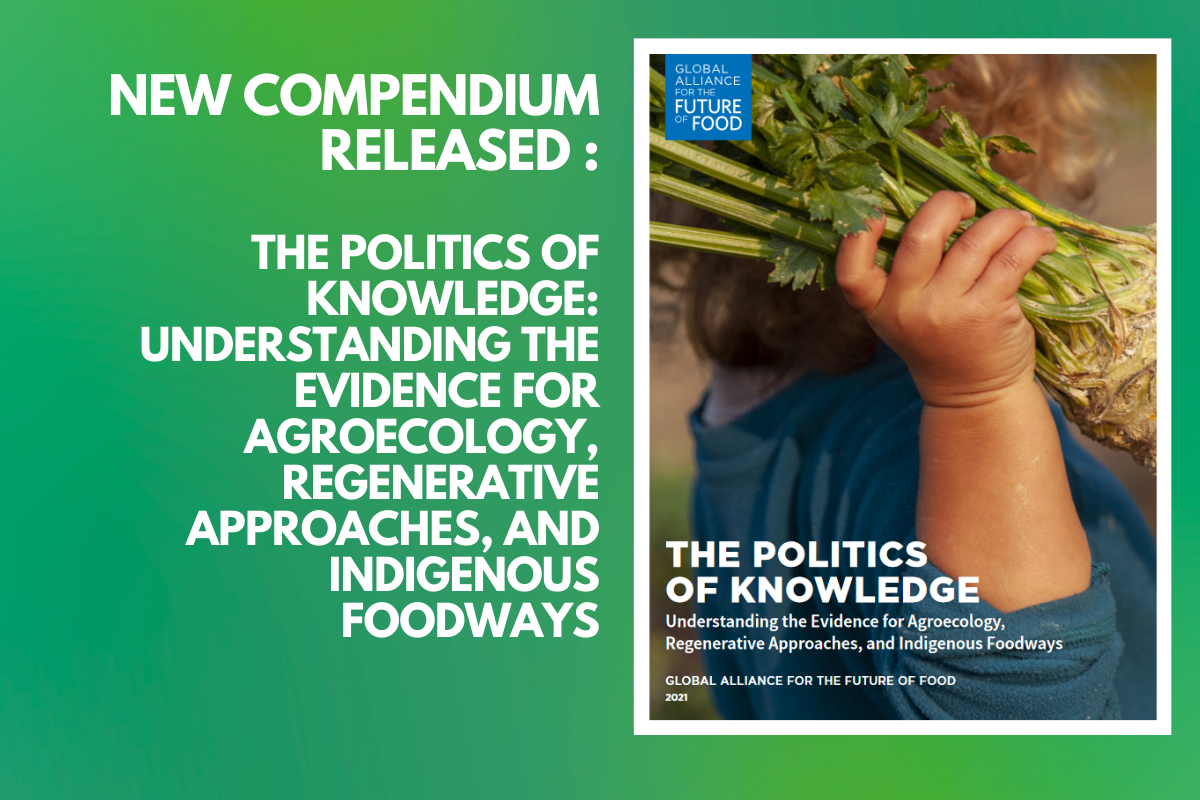
Global Alliance for the future of food (2021) Politics of knowledge: Understanding the evidence for Agroecology, Regenerative approaches, and Indigenous foodways #103 p.
Bringing together diverse speakers and an audience of funders, policymakers, as well as researchers and advocates, the event challenged attendees’ existing ideas and assumptions about evidence and decision making, whilst offering a space for rich dialogue and engagement about the future of food.
- Highlight emerging coalitions, evidence, and policy actions that advance agroecology, regenerative approaches, and Indigenous foodways
- Provide entry points for funders to activate a research and action agenda that is focused on political and social justice, the right to food, and food sovereignty
- Create a space for dialogue amongst global and local audiences about food systems transformation.
- Jane Maland Cady, Collaborative Crop Research Program/McKnight Foundation
- Mamadou Goita, Institute for Research and Promotion of Alternatives in Development
- Peter Gubbels, Groundswell;
- Anna Lappe, Food and Democracy Program at Panta Rhea Foundation;
- Francisco Rosado-May, The Indigenous Partnership for Agrobiodiversity and Food Sovereignty;
- Maywa Montenegro de Wit, Agroecology Research-Action Collective;
- Amaury Peeters, Louvain Cooperation and FAO TAPE;
- Swati Renduchintala, Andhra Pradesh Community Natural Farming;
- Ruth Richardson, Global Alliance for the Future of Food;
- Emma Siliprandi, Agricultural Officer with the Food and Agriculture Organization of the United Nations;
- Mariam Sow, ENDA Pronat
- Francisco Rosado-May (report contributor) Founding President and Full Professor, Universidad Intercultural Maya de Quintana Roo Member (Mayan Intercultural University and works with The Indigenous Partnership for Agrobiodiversity and Food Sovereignty.
- Hassan Roba (report contributor) Program Officer for the African Rift Valley for The Christensen Fund
- Clara I. Nicholls (report contributor) Centro Latinoamericano de Investigaciones Agroecológicas
- Sara Farley, Managing Director, Integrated Operations, Food Initiative, The Rockefeller Foundation
- Tim Searchinger, Senior Fellow and Technical Director, Food Program, World Resources Institute
- Mario Herrero Professor of sustainable food systems and global change in the College of Agriculture and Life Sciences at Cornell University
About the Global Alliance for the Future of Food: The Global Alliance is a strategic alliance of philanthropic foundations working together and with others to transform global food systems now and for future generations.
This compendium is organized in 5 sections:
Section 1 discusses the broader meaning of evidence, the power and politics that shape and infuse our understanding of evidence, what counts as evidence, the broad range of ways evidence is documented, and the historical, epistemological roots that shape our understanding of agroecology, regenerative approaches, and Indigenous foodways.
Section 2 is shaped by five dominant questions identified by the Contributors as contested ground in agroecology, regenerative approaches, and Indigenous foodways.
Can these approaches feed the world?
Can these approaches be scaled?
Can these approaches provide meaningful livelihoods?
Can these approaches solve the climate, biodiversity, and soils crises?
Can these approaches accelerate transformation?
Section 3 provides insights into how evidence is mobilized across different constituencies — who is asking for evidence, for whom, and in what form? Two key findings are that:
different food systems actors (farmers, policymakers, and donors, for example) require different evidence;
relationship-building with these different actors is a key strategy for mobilization.
Section 4 outlines five priority areas to catalyze a transformative research and action agenda that is transdisciplinary; is focused on political and social justice and the right to food and food sovereignty; and challenges entrenched power, vested interests, and structural lock-ins.
Support comparative and systems performance research
Explore questions of scale, time, and space;
Build capacity for transdisciplinary and participatory research and training;
Support knowledge and evidence mobilization as well as communication;
Accelerate transformational pathways.
KEY MESSAGES
Diverse forms of evidence, knowledge, and expertise — including lived experience and traditional knowledge as well as case studies, scientific analyses, and peer-reviewed literature — are fundamental to shifting mindsets and forming the basis for action.
Evidence in support of agroecology, regenerative approaches, and Indigenous foodways exists in a battleground — one of many over knowledge and power.
The political power behind the dominant narratives that marginalize agroecology, regenerative approaches, and Indigenous foodways influences the way that evidence is considered and legitimizes existing power relationships in food systems.
Measuring success, performance, and resilience through a wider systems lens provides evidence on the multifunctional benefits of agroecology, regenerative approaches, and Indigenous foodways.
Encouraging and embracing diverse forms of evidence to be generated, gathered, and communicated increases the legitimacy of agroecology, regenerative approaches, and Indigenous foodways and helps identify gaps that need to be addressed.
Evidence on its own does not catalyze change due to structural barriers, such as short-term thinking, cheap food, export orientation, and narrow measures of success, that keep industrial food systems locked in place. Unlocking these structural barriers requires changing our research, education, and innovation systems.
To accelerate systemic transformation that will build equitable, sustainable food systems, we need to decolonize and democratize knowledge systems within education, research, and innovation.
Participatory, transdisciplinary research and action agendas that bring together farmers, researchers, policymakers, donors, consumers, and other actors across food systems are key to leveraging food systems transformation.
The continued absence of robust and consistent policy, institutional, and financial support for agroecology, regenerative approaches, and Indigenous foodways must be addressed. Funding for long-term research and inclusive programs designed in partnership with farmers and food provisioners, Indigenous Peoples, and women must be a key priority.
Funders and donors must step up to catalyze a transformative research and action agenda that:
is transdisciplinary;
is focused on political and social justice and the right to food and food sovereignty, and
challenges entrenched power, vested interests, and structural “lock-ins.”


No comments:
Post a Comment